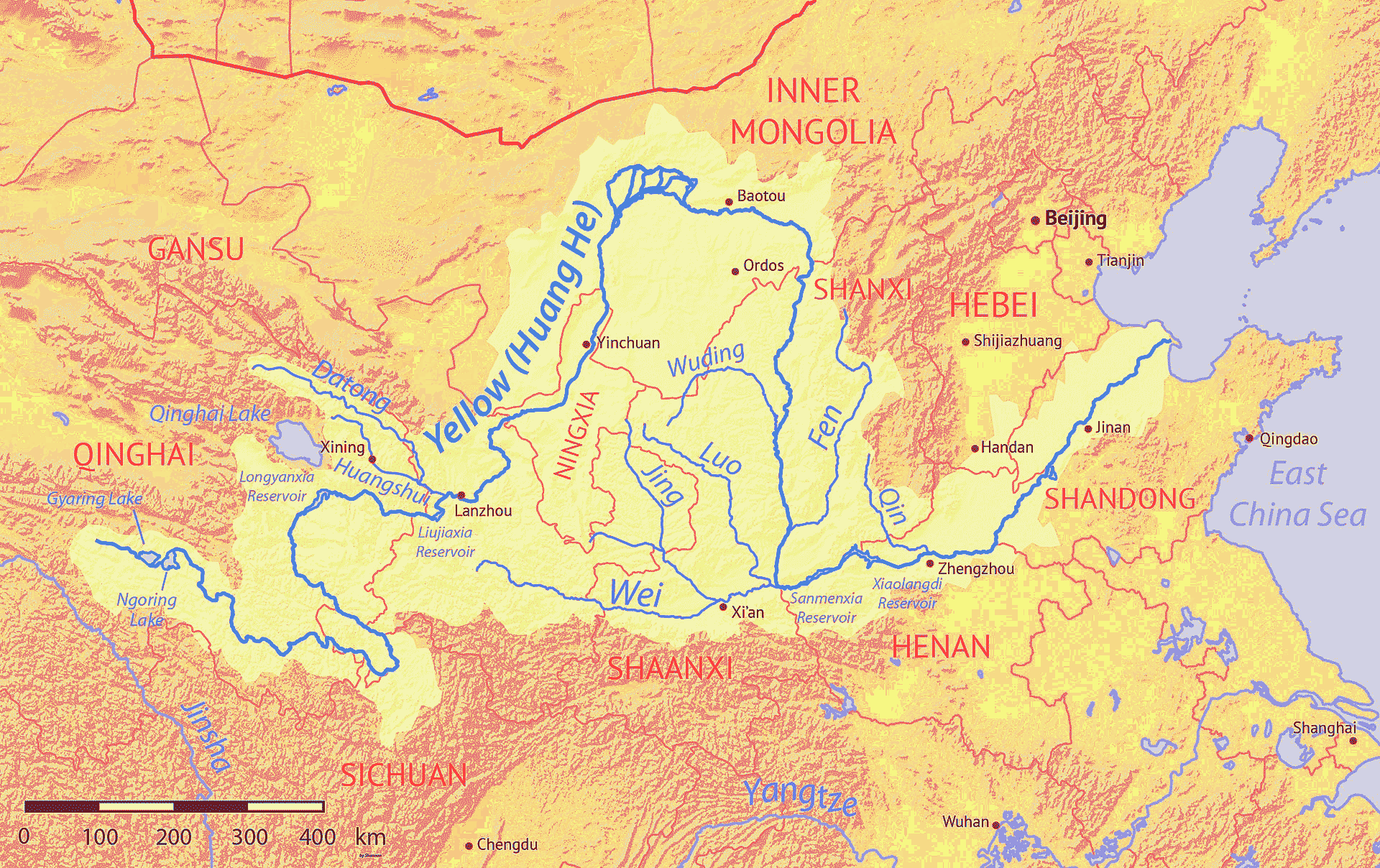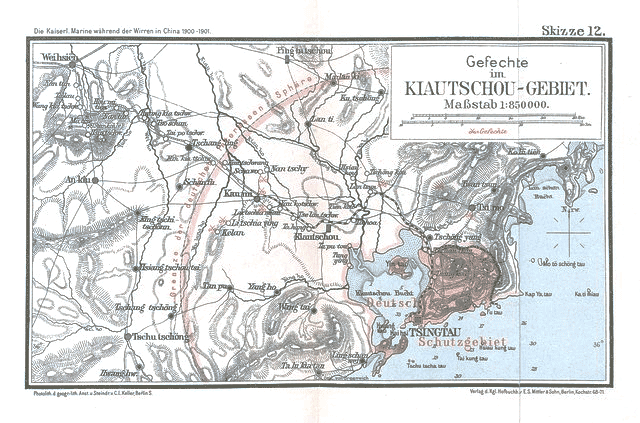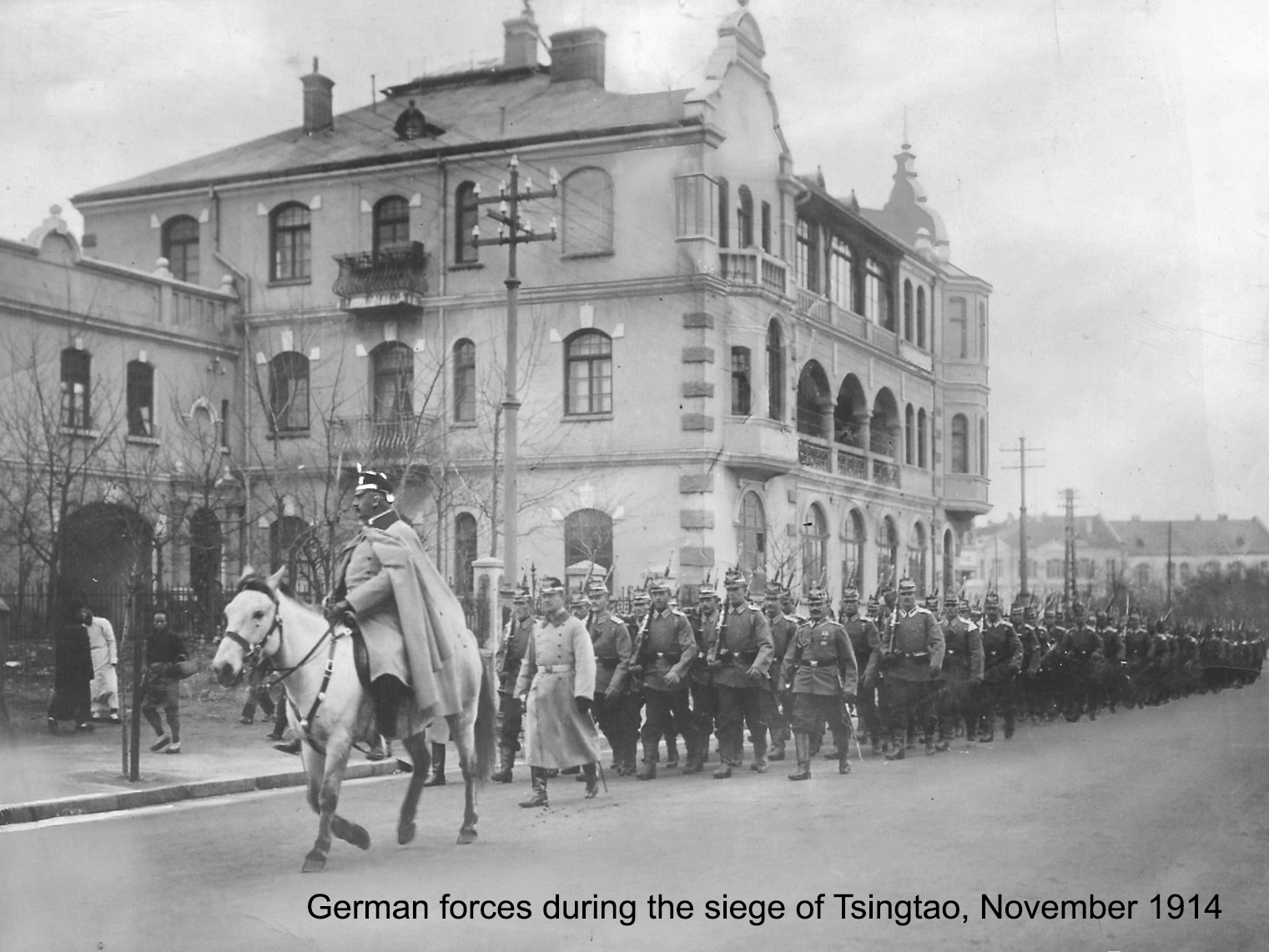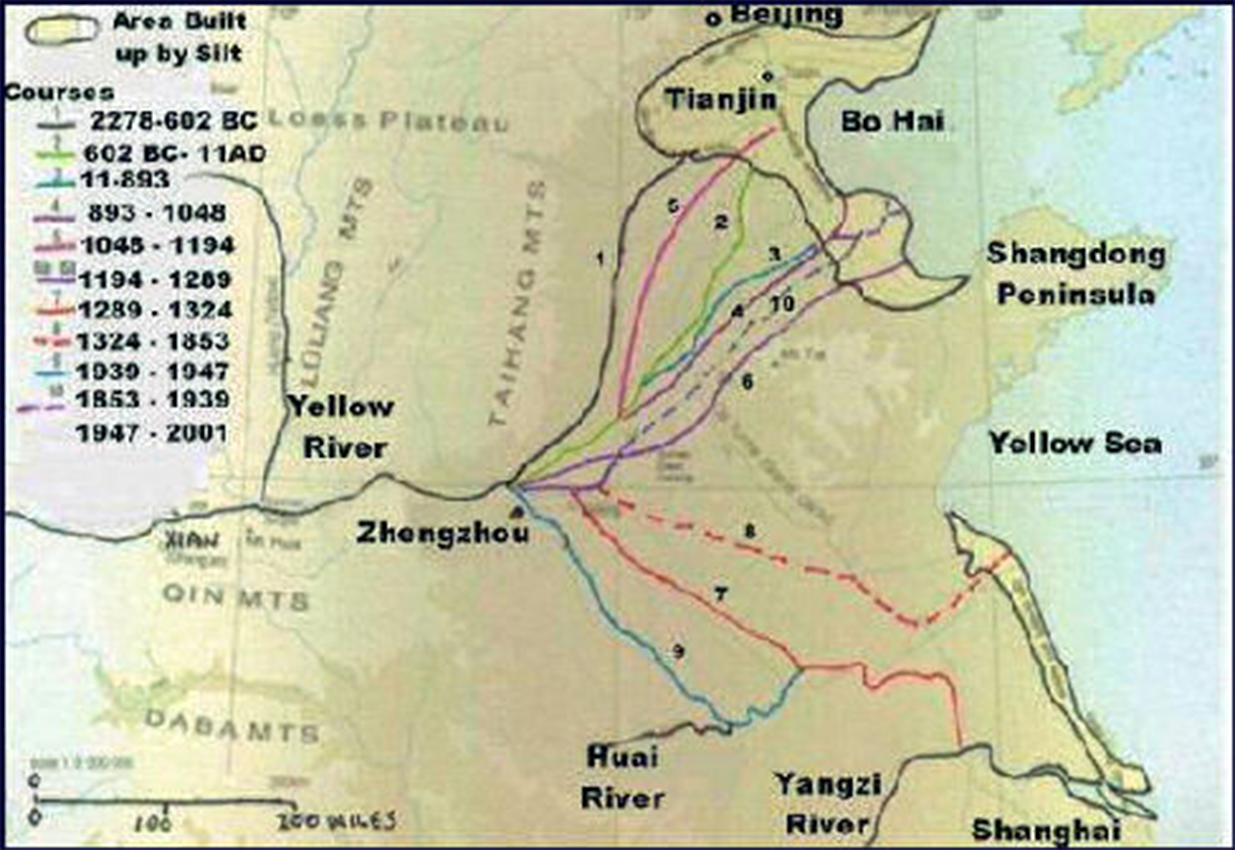CHINA'S Sorrow — the Yellow river — broke its banks once
more, and from the breach there poured into the plain not
merely the waters of the river but, as I estimated later, a
thousand million cubic yards of silt, which, spreading itself
over an area of two hundred square miles with a depth
averaging 'five feet or so, engulfed dozens of villages and
rendered great tracts sterile; but on the fringe of the area
affected it left a fine deposit of unsurpassed fertility.

The river in the plain flowed through three provinces —
Honan, Chihli and Shantung — and the Viceroy of the second
and the Governor of the third were Basse's friends, Yuan
Shih-kai and old Chou-fu. There was nothing extraordinary
in this flooding — it happened every now and then — but Basse's
friends asked what he thought about it. He replied that
several foreign engineers had in the past reported on the river,
and it seemed to him they had failed to realize that a river with
such extraordinary features might need extraordinary treatment rather than an orthodox one based on practice with normal
rivers elsewhere; that anyhow the problem was as much an
administrative one as it was technical; and he recommended
that I should be invited to report upon the matter. Thus Basse,
trying to push me on and give me opportunities; he had consulted me about the river some time before, and I had posted
him upon the subject without knowing what he had in view.
So the two satraps asked Sir Robert Hart to lend me for this
work, and in February 1903 Basse, Corsten — a Danish military
engineer employed in some capacity by Yuan — and I started
from Tientsin for Chinanfu. Before I left, Yuan Shih-kai had
told me how until quite recently there had been a Viceroy of
the Yellow river charged solely with its maintenance; but
since the Boxer time the post had been discontinued, and now
the three provinces managed their sections independently and
with no arrangement for co-ordination. He and Chou-fu were
anxious to co-operate, but the Governor of Honan at Kaifengfu
was a doubtful factor; it would be for me to try and bring him
into line with some general scheme.
Of course I was as keen as mustard about this splendid
amateur adventure; but let me say at once that in this affair —
as in most of the big affairs that from time to time I have put
my hand to — I fell short of full success, for at Chinanfu I learnt
from old Chou-fu that it would be useless to go to Kaifengfu
as it had been ascertained that the Governor there was antagonistic to any change — doubtless he feared curtailment of his
peculations from the river funds. But on the other hand I
did not fail entirely; my printed report (1) remains, I think, the
most informative on the condition of the Yellow river, and it
led later to other activities in river work.
1 — Extract from a letter of mine to the Inspector-General — When I was
at home I showed that report to Sir Charles Hartley and to Mr. Vernon
Harcourt — the two most eminent river engineers in England. On the
strength of it they got me made an Associate of the Institution of Civil
Engineers; very few are now made, and those who were elected at the
same time as myself were Lord Armstrong, Admiral Wharton, the Hydrographer, and the Hon. T. Brassey.'
There was no railway at that time between Tientsin and
Chinanfu. We rode the two hundred miles or so; two ponies
each, and we did our thirty miles or so a day. The carts — with
beds, baggage, cooking gear, stores and servants — limited the
daily distance. A cart or two was loaded up with strings of
cash — perhaps half a ton — to pay our expenses on the way
some forty cash were a pennyworth, and there was no other
currency generally acceptable. At each township our mounted
guards — provided to protect us from the brigands with which
the country was infested — were changed — weird medieval-
looking figures who, as likely as not, had themselves been
brigands in their time and would be so again.
We put up for the night at inns — a courtyard surrounded by
unfurnished mud-floored rooms with charcoal scribbled walls —
where the legs of our camp-beds were placed in bowls of water
to prevent the bugs from crawling up. The story goes that
it is well to mount an umbrella as a covering, for the beasts,
foiled in their attempt upon the legs, climb up the walls, walk
across the ceiling and then let go and drop upon the bed.
I must restrain the tendency to extraneous episodes; otherwise I should like to tell the story of how, before that journey's
end, I contracted an internal abscess, and because of the
excruciating pain was given morphia, and later gave myself
some and broke the needle in my arm and spilled the tabloids
in the bed; 'then — quite irresponsible for what I did — spent
the night in searching for and eating them, with the most
interesting results in the way of visions; how I was carried in
a litter to an American missionary hospital at Chinanfu and
was operated on by Dr Neal; how, when convalescent, I joined
the circle of his charming family and there met missionaries of
various sects, who freely discussed religious matters with me —
I told them of my father, of his sense of dignity in religion, so
opposed to their own curious familiarity — and how, as a result,
I was persuaded to hold a service to show them how I thought
it should be done.

A short time before, the Governor of Tsingtau — the port that
Germany had grabbed — had paid Chou-fu a visit, and there
were banquets at which the German made long-sentenced
speeches, with moustaches bristling with the earnestness of his
importance as the Kaiser's representative; and quite plainly,
he made the Chinese very tired. In those days, speeches were
not a custom at a feast, and the reply from Chou-fu would be
of the very briefest. Then, as a consequence of the German
visit, and while I was there, came Stewart-Lockhart, now Sir
James, the British Commissioner at Weihaiwei — an exemplar
of a very different method. His knowledge of the language
was not merely that of a sinologue; he knew the vernacular
— the argot of the gentry class. To Chou-fu he said he
had not come to bother him with politics, but to pay
his respects to a venerable Governor and to visit Confucius'
shrine; and at the banquets his speeches were full of wit
and humour and sometimes very bold — but he knew his
power. Thus in proposing the health of the Provincial
Judge, he commented on the different ways of East and
West, and on how much the East could teach the West.

 [click]
[click]
I hear that His Excellency the Judge can try a prisoner
and pass judgment on him, without even having seen him or
having heard a word of evidence; and that is more than we
have so far attained to.' The Judge took the laughter from
this sally very well, but stored up its remembrance and waited
for his chance. It came a few days later at another feast.
I am told by my emissaries, whose duty it is to guard him,
that His Excellency the Commissioner visited this morning
such-and-such a shrine and purchased there a wa-wa — a little
clay figure of a naked boy that women buy who desire a son.'
The Judge paused and then proceeded solemnly and slowly,
and I sincerely trust that when His Excellency returns to
Weihaiwei, he will find it efficacious.' I rather believe that it
was those light-hearted speeches of Stewart-Lockhart and the
response they drew that started the practice with the Chinese.
There was a sequel to that story. A year or so later Stewart-
Lockhart visited Chinan again and once more proposed the
Judge's health. Speaking of the commercial honesty for which
the Chinese were so famous, he said, 'Yet there are lapses now
and then, and one — from which I personally suffered grievous
disappointment — I wish to bring officially to the notice of the
Judge. He will remember that, when last I paid a visit to our
venerable host, I bought a wa-wa at a temple. It purported to
be the genuine article, but it was not: I got another daughter.'
I inspected the hundred miles of river from Chinan to the
sea; had long talks with the river officials on ways and means
and methods, and from them learnt more about the history of
the river than had ever been recorded. The Chinese had only
one idea: to keep the river within its elevated bed, and when it
left it, to get it back. For that purpose their methods surpassed anything the foreign engineer could teach them. The
foreign engineers who had reported on the river had also only
one idea: to so improve the river's regimen as to cause it to
carry its load of silt down to the sea. But that aim is quite
impossible; the river's function is to raise the plain, and it will
fulfil that function, however Man may try to stop it. The
one and only remedy is to have artificial floods to provide for
silt deposit, instead of accidental ones, and so march with
instead of contrary to nature. And that was the text of
my report.

For thousands of years the river has been China's sorrow.
Each year a half million sterling is spent upon its maintenance;
each year on the average — a disaster comes at intervals of years
— it causes a quarter million sterling's worth of damage; each
decade or so, on the Great Plain of China, a million lives or
more are lost from floods or drought, owing to the condition
on the rivers. That plain has an area of about a hundred
thousand square miles, and its forty million inhabitants live
in a constant state of ever-impending disaster. They have
done so for thousands of years. Nowhere else in all the world
is there such a period-area of calamity.
There is nothing inevitable about this condition. It is
man-made, not nature-made. The evil done can be undone.
Not only so: the features of the rivers that now make for evil
admit of being turned to benefit. Their waters could be used
for irrigation; their silt for fertilization; and that Great Plain
could be converted from an area of ever-impending tragedy to
one of security and unsurpassed prosperity; and it would be
a vastly profitable business undertaking.
Although those millions live under the shadow of disaster,
it must not be thought that their normal lives are miserable.
They are no more miserable than the peasants living on the
slopes of Etna. But in a famine area — say from floods — there
is a tragic suffering that sears one's heart to witness. The
people are crowded on the dykes, which are edged with matshed hovels; their crops are gone, they have no seed for others
boiled willow leaves is all they have to eat; the naked children
have distended stomachs and their legs are no longer bifurcated
— there is a wide gap where the femur bones join the pelvis.
The tragedy is borne in patient silence like that of an animal
in sickness; but there are whispers of hunger-mad men and
women having secret gruesome meals.
There is nothing like the Yellow river elsewhere in the
world. It is not only that it runs above the level of the plain;
to a lesser extent the Mississippi also has that feature; it is
among the five longest rivers, but its volume is not large; it is
useless for navigation — it is just a drain. Yet it is unique, for
there is no other river which combines its vigorous youthfulness, the load it carries, the vastness of its virtual delta, the size
of its unaccomplished task in building up the plain, and the
contempt it shows, when every now and then it spews out a
quarter of a cubic mile of silt, for Man's efforts to prevent it
from exercising a natural function.(1)
1 — An extract from a letter written in 1906 to Mr. Oudendijk, the Dutch
Minister, in which in reply to some inquiry I briefly express myself on the
problem of the Yellow river, seems worth recording and is given in
Appendix C.
#




 [click]
[click]
